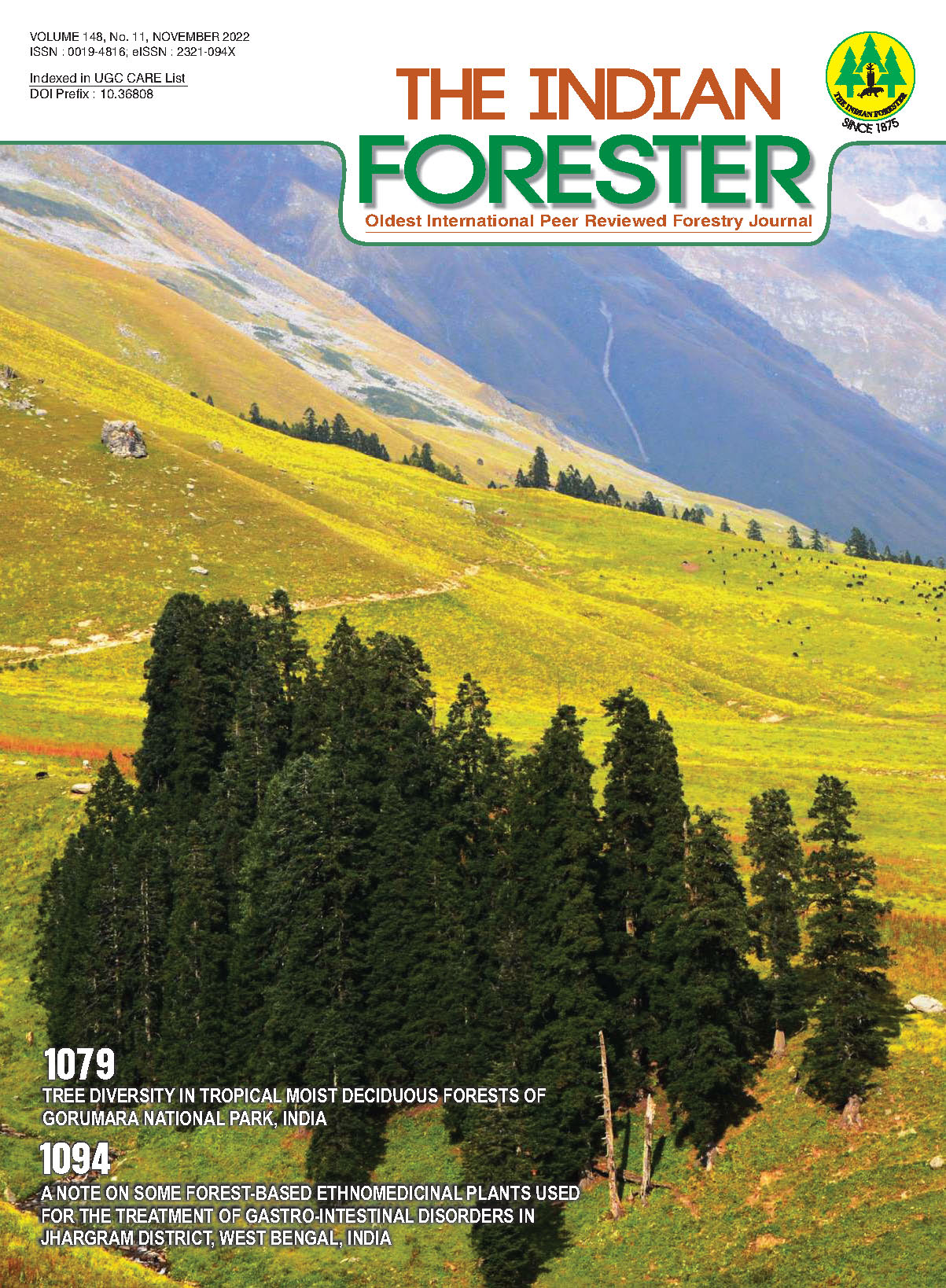Tribal culture, Traditional Knowledge and Forest Management in India: An Environmental Justice Perspective on Forest Rights Act
DOI:
https://doi.org/10.36808/if/2022/v148i11/165209Keywords:
Tribal Culture, Traditional Knowledge, Forest Rights Act, Environmental Justice, Local Participation, Social Justice, Sustainable DevelopmentAbstract
This paper seeks to examine the “Scheduled Tribes and Other Traditional Forest Dwellers (Recognition of Forest Rights) Act, 2006”-popularly known as 'Forest Rights Act'-and its subsequent amendment brought in 2012, from the environmental justice perspective. The main purpose of this study is to analyse its environmental justice content with special reference to the state's approach towards tribals' local cultural practices and traditional knowledge possessed by the forest communities especially tribals-in the forest management. The study adopts the social environmental justice perspective as its analytical framework to explore to what extent the customary and cultural practices as well as the values and beliefs systems based traditional knowledge of tribal communities living in India find any articulation in the exiting forest legal structure.
References
Adeola, Francis O. (2000). Cross-national Environmental Injustice and Human Right Issues: A Review of Evidence in the Developing World. American Behavioral Scientist, Vol. 43 (4): 680-696.
Agrawal, Arun. (1997). Community In Conservation: Beyond Enchantment And Disenchantment. Gainesville, FL: Conservation & Development Forum.
Alam, Shawkat. (Et al.). (2011). Globalization and the Quest for Social and Environment Justice: The Relevance of International Law in an Evolving World Order. New York: Routledge.
Blewitt, John. (2008). Understanding Sustainable Development (2nd ed). London and New York: Routledge.
Bürgi, Matthias and A. Schuler. (Eds.). (2003). Driving Forces of Changes in Forest Management: An Analysis of Regeneration Practice in the Forests of the Swiss Lowlands during the 19th And 20th Century. Forest Ecology and Management 176: 173-183.
Government of India. (2006). The Scheduled Tribes and Other Traditional Forest Dwellers (Recognition of Forest Rights) Act, 2006. New Delhi: Ministry of Environment and Forests.
Government of India. (2012). The Scheduled Tribes and Other Traditional Forest Dwellers (Recognition of Forest Rights) Amendment Rules, 2012. New Delhi: Ministry of Environment and Forests.
Hoare, A. L. (2010). Community based Forest Management in the Democratic Republic of Congo: A Fairstyle or a Viable REDD Strategy. UK Forest Monitor Working Paper. Retrieved from http://www.indiaenvironmentportal.org.in/files/cfm.pdf
Houde, N. (2007). The Six Faces of Traditional Ecological Knowledge: Challenges and Opportunities for Canadian Co-Management Arrangements. Ecology and Society. Retrieved from http://www.ecologyandsociety.org/vol12/iss2/art34/
Joan, Martinez-Alier. (2012). A Companion to Global Environmental History. West Sussex: Blackwell Publishing Ltd.
Karan, P. P. (1994). Environmental Movements in India. Geographical Review. Retrieved from https://www.jstor.org/stable/215779?seq=1
Kothar, Ashish. (2007). Traditional Knowledge and Sustainable Development. Manitoba: International Institute for Sustainable Development (IISD).
Kuehn, Robert R. (2000). A Taxonomy of Environmental Justice, Environmental Law Reporter. Retrieved from https://ir.lib.uwo.ca/cgi/viewcontent.cgi?referer=https://www.google.com/&httpsredir=1&article=1137&context=aprci.
Kumar, Sanjay. (2001). Indigenous Communities: Knowledge of Local Ecological Services. Economic and Political Weekly, Nov.: 2859-2869.
Mallory, Chaone. (2010). Environmental Justice in Brazil. K-12 Workshop on Brazil, Villanova University.
Paehlke, Robert. (Eds.). (1995). Conservation and Environmentalism: An Encyclopaedia. London & Chicago: Fitzroy Dearborn Publishers.
Parrotta, John. Youn Yeo-Chang and Leni D. Camacho. (2016). Traditional Knowledge For Sustainable Forest Management And Provision Of Ecosystem Services. International Journal of Biodiversity Science, Ecosystem Services & Management, 12 (1-2): 1-18.
Roberts, R. G. (1998). Environmental Justice and Community Empowerment: Learning from the Civil Rights Movement. American University Law Review. Retrieved from https://digitalcommons.wcl.american.edu/cgi/viewcontent.cgi?referer=https://www.google.com/&httpsredir=1&article=1316&context=aulr
Razzaque, Jona. (2009). Participatory rights in natural resource management: The role of communities in South Asia, In Jonas Ebbesson and Phoebe Okowa (Eds.). Environmental Law and Justice in Context (Chapter 5). Cambridge: Cambridge University Press.
Rodes Jr., Robert E. (1996). Social Justice and Liberation. Notre Dame Law Review, 71: 614- 625.
Sahay, Ravi Sankar. (2012). Post-colonial Forest Policy of India and Tribal Communities of Jharkhand. Proceedings of the Indian History Congress, 73: 1350-1368.
Saunier, Richard E. and Richard A Meganck. (Eds.). (2009). Dictionary and Introduction to Global Environmental Governance. London and Sterling, VA: Earthscan.
Shapiro, Judith. (2012). China's Environmental Challenge. Cambridge: Polity Press.
Spencer, Banzhaf H. (Eds.). (2012). The Political Economy of Environmental Justice. California: Stanford University Press.
Times of India. (2015). Make Clean air a Birth-right of Every Indian. Times of India. Retrieved from https://timesofindia.indiatimes.com/home/environment/pollution/Clean-air-must-be-a-birth-right-for-all-Environment-minister-Prakash-Javadekar/articleshow/46136193.cms
United Nations. (1992). Agenda 21: Programme of Action for Sustainable Development. New York: United Nations Conference on Environment and Development (UNCED).
United Nations. (2001). Indigenous Peoples, indigenous Voices. United Nations Permanent Forum on Indigenous Issues. Retrieved from https://www.un.org/esa/socdev/unpfii/documents/5session_factsheet1.pdf
Downloads
Downloads
Additional Files
Published
How to Cite
Issue
Section
License
Unless otherwise stated, copyright or similar rights in all materials presented on the site, including graphical images, are owned by Indian Forester.





